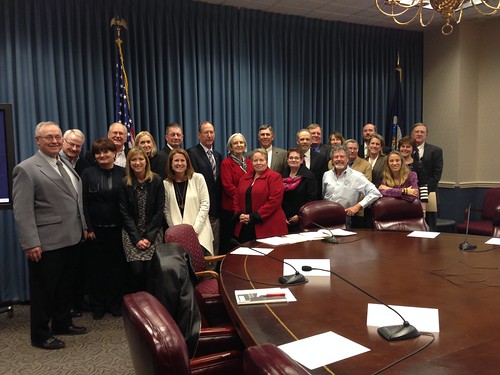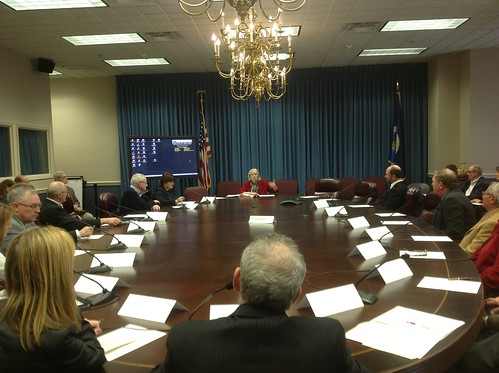
“Water conservation begins where the first drop of rain falls…most likely on private working lands.” This is a favorite saying of Tom Vandivier, a Texas cattle rancher and 2008 recipient of the Sand County Foundation’s Leopold Conservation Award (LCA).
Tom was one of more than two dozen recipients of the LCA – which recognized landowners for achievement in environmental improvement on agricultural land – in Washington, D.C. last week. I was fortunate to meet with them here at USDA headquarters to talk about the importance of conservation and the need to spread the message that investing in conservation practices on our farm and ranch lands not only protects water, air and wildlife – it also makes economic sense.
Jill Giacomini Basch is a 2013 LCA recipient who, with her father and three sisters, owns a family dairy in Marin County, Calif. I had a chance to meet with the Giacomini family during my tour of several California farms last month. Jill explained that conservation improves the way they run their business. Partnerships with USDA’s Natural Resources Conservation Service and others have helped them protect their land and water resources, and ensure their dairy will be prosperous for the next generation.
“We have very close ties with NRCS and other programs,” Jill said. “They have helped us with our water allocation -- above ground storage pond facilities and spring well drilling. With the USDA we were able to utilize new technology to install a methane digester to help mitigate waste run off into the nearby lagoon, but also eventually the Point Reyes National Seashore. Because of the methane digester, we generate about 65 percent of our on farm energy needs.”
“Much of the work we’ve done has been through NRCS programs,” Tom added. “NRCS is very important to us. We’re very much about conservation. The stewardship practices that we’ve accomplished on our property have enhanced water resources in the state of Texas. I think it’s a message that needs to be spread so others can take similar stewardship practices and hopefully have the same results in their perspective states.”
Jon Bednarski, 2013 LCA recipient, shared his story as well. He started farming 12 years ago outside of Louisville, Ky. After meeting with NRCS, he discovered he was farming a “sensitive” piece of land, upstream of Louisville’s drinking water source. Since then he has managed his operation to help protect water quality.
The group discussed the need for conservation in the face of extreme weather – including the significant drought conditions in 11 western states. As we were meeting, the U.S. Senate was in the process of voting on the Agricultural Act of 2014. I talked about how important this legislation is to providing the tools and programs necessary for USDA to help farmers, ranchers and forestland owners manage the risk and uncertainty associated with extreme weather and climate change. Conservation programs will be streamlined to better target limited resources to areas of highest need, while building on record conservation and stewardship efforts already underway. I also previewed Secretary Tom Vilsack’s announcement of USDA’s new regional hubs to help agriculture and forestry mitigate the impacts of a changing climate.
The group also discussed the importance of passing on to the next generation the passion for agriculture and land stewardship. There is a new energy in America around opportunities in agriculture. The Agricultural Act of 2014 will provide our communities with additional support to attract new economic opportunity and create jobs. We all agreed that outreach and education is crucial. USDA will continue to work with the LCA recipients and other partners to make that happen. To view a video about the meeting click here.


